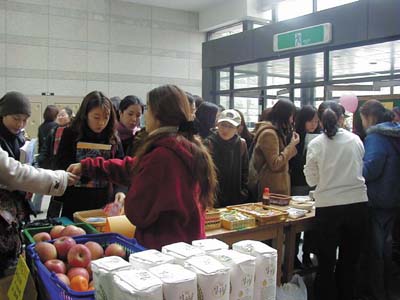
The main role of the organization is to supervise the operation of the store in the Student Union Building. This is a multi-purpose place despite its relatively small size. The store includes a stationery shop, a souvenir shop, several copy machines, a cosmetics shop, a food shop, and a bakery. The school supplies and food sold at ECOOP shops are cheaper than in other stores in and out of school by 20 percent and ten percent respectively. As a member of ECOOP, Im was able to get an hourly pay job within the store as a bakery salesperson.
"Kim Jin-woo (Political Science & Diplomacy, 3), a senior committee member, explains ECOOP as a "union calling for cooperation." "The association gains power of voice and of action through students" involvement in the union," says Kim. One can join by simply signing up as a union member and paying a 1,000 won entrance fee. There are countless benefits that members gain by joining. The profit made through sales in the store and other activities is returned to union members in the form of scholarships, part time jobs in the shops, 5,000 won coupons for every 100,000 won and more.
The structure of ECOOP, is made up of three different member groups: students, professors, and other university staffs. All together, out of 2,142 union members, 1,501 are students (according to statistics provided by ECOOP on February). Currently Lim, Kim, and 14 other students make up the central committee that organizes its many activities. They also do surveys on student opinions of products and services, and do market analysis to provide better quality and better prices.
Cooperative unions like the one at Ewha exist in other universities as well, including Yonsei, Sogang, Sejong, Dongguk, and Seoul National Universities. Ewha"s Cooperative Union, begun 13 years ago, is one of the first of such groups. "ECOOP should be in a position to provide guidance for newly established unions at other universities. However, it is not capable of doing that because it has lost its driving force. The propeller of ECOOP was and is supposed to be students willing participation and attention to improving the means by which their needs are met at school," says Kim. Lim laments that "many students are not aware of the existence of ECOOP, and to exacerbate the situation, the union members themselves show little participation and sometimes even forget that they are union members. There are so many benefits waiting to be given to students. But the students aren"t taking them."
ECOOP"s promotion pamphlet states, "It is through students" engagement with ECOOP that they can present their opinions on matters concerning their welfare." Passivity results in no change. It is through actively finding ways to make improvements in the institutions within the school that changes can be brought about. No one will represent them unless students represent themselves.
neyessioui@ewha.ac.kr
Ewha Voice
evoice@ewha.ac.kr

